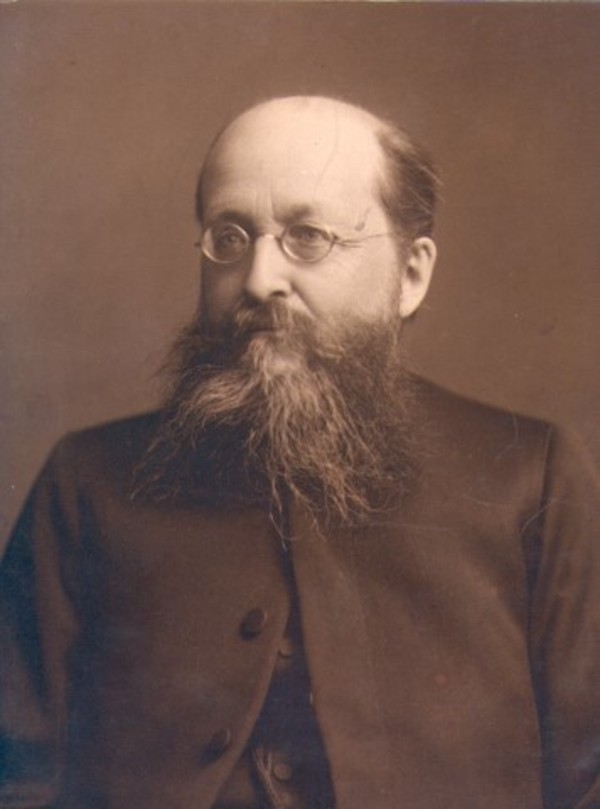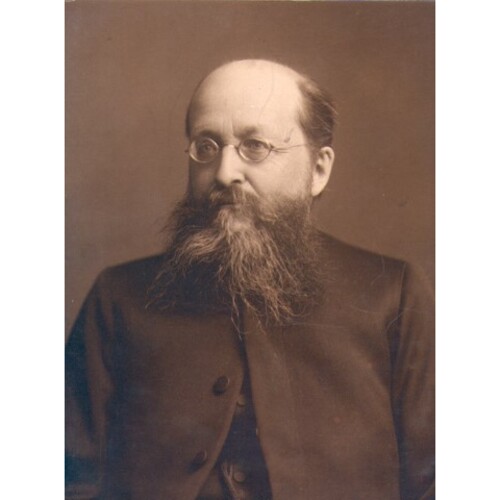
Source: Link
SHERATON, JAMES PATERSON, Church of England clergyman, educator, editor, and author; b. 29 Nov. 1841 in Saint John, N.B., son of Robert Sheraton, a merchant, and Anna Towers Paterson; m. first 12 Dec. 1866 Margaret Wright (d. 1874) in Richibucto Parish, N.B., and they had a son, Robert William (d. 1899); m. secondly 8 April 1875 Rachel Mary Stewart in Pictou, N.S.; d. 24 Jan. 1906 in Toronto.
At the age of seven James Paterson Sheraton entered Saint John Grammar School, whose principal was his maternal grandfather, James Paterson. He attended the University of New Brunswick, and in 1861 received his ba in classics and natural science. He studied theology under John Medley*, bishop of Fredericton, and the Reverend John Armstrong, rector of St James’ Church, Saint John, as well as at King’s College, Windsor, N.S. Ordained deacon in 1864 and priest the following year, he served mission churches in New Brunswick, notably at Shediac and Weldford, until 1872. He worked briefly that year in the diocese of Huron, Ont., but for family reasons returned to a mission in Petersville, N.B. (1873–74). From 1874 to 1877 he was rector of Pictou.
In 1873 a number of Anglican laypeople of evangelical conviction in Toronto, resenting their exclusion from diocesan decisions, had organized an advocacy group called the Church Association of the Diocese of Toronto. Soon they were taking aim at the Anglican college, Trinity. They claimed that its faculty of divinity taught students to disown the Reformation, and that its faculty of arts was unnecessary since its work was being done more effectively by the provincial institution, University College. By 1874 the Church Association was proposing its own theological school. A recognized evangelical and scholar, Sheraton was suggested as an ideal candidate for principal. After repeated offers, the association persuaded him in 1877 to accept the position at a salary of $1,500.
The Protestant Episcopal Divinity School opened on 1 Oct. 1877 with ten students, plus two others in “partial attendance,” in a room in the schoolhouse of St James’ Cathedral, whose rector, Henry James Grasett*, was clerical vice-president of the Church Association. The school had no library and no professors other than Sheraton, who taught biblical exegesis and systematic theology. The bishop of Toronto, Alexander Neil Bethune*, announced that he would not ordain its graduates and he refused to license Sheraton, who had no authorized ministry in the diocese. But Sheraton enjoyed an immense advantage: the school was supported by some of the most influential Anglicans in Toronto. Its board of management included Edward Blake*, Samuel Hume Blake*, Casimir Stanislaus Gzowski*, William Holmes Howland*, and Daniel Wilson*. The school would become the focus of conflicts in Anglicanism in Toronto, with the evangelical party positioned against the high church and the aspirations of the laity against episcopal prerogative and clerical authority.
Sheraton assumed the major responsibility for the administration and development of the school, which was incorporated in 1879. The following year its first four graduates were ordained by a new, more conciliatory bishop, Arthur Sweatman. By 1882 Sheraton had helped raise an endowment of $89,000, and in October of that year he opened the school’s first building, on College Street west of Queen’s Park. Designed by William George Storm*, it was called Wycliffe College, apparently on Sheraton’s advice, in commemoration of the 500th anniversary of the first Wycliffite translation of Scripture. Soon the name of the building was being used for the institution and in 1885 the new name was legally recognized. That same year the college was affiliated to the University of Toronto; by this arrangement some of its courses were made available to students at University College, and Sheraton became a prominent member of the university senate. He was active in the movement for university federation, and in 1889 Wycliffe became a federated college of the University of Toronto. In the same year the Anglican church’s ecclesiastical province of Canada finally gave Wycliffe formal recognition and appointed Sheraton to a new board of examiners for degrees in theology. The college moved in 1891 to its present building on Hoskin Avenue, designed by David Brash Dick. At that time it had a library of some 8,000 volumes and a staff of four paid professors, among them two graduates, Frederick Herbert DuVernet and George MacKinnon Wrong*. By 1906, when Sheraton died, reportedly from an illness caused by overwork, 170 of his students had been ordained.
Sheraton’s position as principal involved him in constant controversy. His detractors called him a “hireling agitator” whose “evil work will curse the Church for generations.” Time and again he provoked high-church sensibilities by disparaging Trinity as “sectarian,” by mocking the idea that there was an Anglican way to teach mathematics, and by allying Wycliffe with University College, Knox College, and Toronto Baptist College. One high-church columnist accused him of urging divinity students to “mingle with and make companions of blasphemers, sceptics, revilers of God’s law and God’s church.” Sheraton also annoyed high-church thinkers by championing modern historical criticism which, he maintained, “pulverized” their view that the traditions and lines of authority within the church had been established personally by Jesus Christ.
Widely read in English and German scholarship, Sheraton was regarded as “a walking theological encyclopedia,” according to his obituary in the Canadian Churchman. But his outlook was often narrow: he easily equated Catholic with institutional formalism and Protestant with biblical faith. His perspective on Scripture and Church derived to a considerable extent from other writers, notably the English biblical critics Brooke Foss Westcott and Joseph Barber Lightfoot. And while he loved historical criticism when it was applied against Catholic tradition, he mightily resisted it when it was applied to Scripture. Sheraton’s narrow theological outlook and his penchant for controversy probably helped Wycliffe in the early years, while it was establishing its identity and winning support from laypeople eager to confront Anglican clericalism. But as diocesan partisanship cooled, moderate evangelicals began to account Sheraton’s uncompromising temper something of a liability. The principal’s deep personal piety, his clear teaching, and his friendship exerted a powerful formative influence on the generation of students whom he trained, but his extremist streak tended to isolate Wycliffe ecclesiastically. By contrast, his successor, Thomas Robert O’Meara, took Wycliffe in a more pastoral direction, and it may be significant that within five years enrolment had doubled.
Between 1877 and 1882 Sheraton had edited the Evangelical Churchman, building for it an international reputation. He wrote numerous pamphlets, booklets, and newspaper articles, and produced a stream of expositions of Sunday-school lessons, but he never completed a major work. Queen’s College, Kingston, awarded him an honorary dd in 1883, and the University of Toronto gave him an lld in 1896. He worked in the Lord’s Day Alliance, the Evangelical Alliance, the Canadian Temperance League, and the Bible Society, and was a member of the board of Bishop Ridley College in St Catharines, which was begun by supporters of Wycliffe. Known as “the little Doctor,” Sheraton was short in stature and delicate in physique, with a bald head and a bushy long beard, ruddy cheeks, thick glasses, and a small voice.
James Paterson Sheraton is the author of a number of printed pamphlets, including: Christian science ([Toronto, 1891]); The history and principles of Wycliffe College: an address to the alumni . . . October 7th, 1891 (Toronto, 1891); The inspiration and authority of the Holy Scriptures: an address to the alumni, October 3rd, 1893 (Toronto, 1893); The idea of the church: an address to the alumni, October 8th, 1896 (Toronto, [1896]); Our Lord’s teaching concerning himself ([Princeton, N.J.?], 1904); The higher criticism . . . (Toronto, 1904); and The higher criticism of the Old Testament, intro. William Caven (New York, 1905). All of these publications are preserved in Sheraton’s file at Wycliffe College Library, Toronto, some in several copies. His lecture notes and principal’s papers are in the college’s archives.
PANS, RG 32, WB, 81: 129, no.70. Wycliffe Colllege Arch., ser.1-B, boxes 1–2 (council and trustees minutes, 1878–1907); ser.2, box 9 (Church Assoc. scrapbook); ser.8E, box 11 (associations); ser.9, box 3 (Wycliffe clippings, 1874–78; Church Assoc. clippings, 1874–78). Daily Mail and Empire, 25 Jan. 1906. Globe, 25 Jan. 1906: 1, 6. Toronto Daily Star, 24 Jan. 1906. Canadian Churchman, 1 Feb. 1906: 72–73. Canadian men and women of the time (Morgan; 1898). The clergy list . . . (London), 1865–1906. Crockford’s clerical directory . . . (London), 1865–1906. Dominion Churchman, 3 Nov. 1887: 660. Evangelical Churchman (Toronto), 1 Nov. 1877; 7 (1882–83): 332–34; 8 (1883–84): 413–14; 10 (1885–86): 463–64; 13 (1888–89): 389; 15 (1890–91): 19–22. A. L. Hayes, “The struggle for the rights of the laity in the diocese of Toronto, 1850–1879,” Canadian Church Hist. Soc., Journal (Toronto), 26 (1984): 5–17. In memoriam, J. P. Sheraton (Toronto, 1906; copy in Wycliffe College Library). Jakob Jocz, “The principalship of James Paterson Sheraton, 1877–1906,” The enduring word: a centennial history of Wycliffe College, ed. Arnold Edinborough (Toronto, 1978), 3–22. The jubilee volume of Wycliffe College (Toronto, 1927). Vital statistics from N.B. newspapers, 1866–67 (Johnson), no.944.
Cite This Article
Alan L. Hayes, “SHERATON, JAMES PATERSON,” in Dictionary of Canadian Biography, vol. 13, University of Toronto/Université Laval, 2003–, accessed December 28, 2025, https://www.biographi.ca/en/bio/sheraton_james_paterson_13E.html.
The citation above shows the format for footnotes and endnotes according to the Chicago manual of style (16th edition). Information to be used in other citation formats:
| Permalink: | https://www.biographi.ca/en/bio/sheraton_james_paterson_13E.html |
| Author of Article: | Alan L. Hayes |
| Title of Article: | SHERATON, JAMES PATERSON |
| Publication Name: | Dictionary of Canadian Biography, vol. 13 |
| Publisher: | University of Toronto/Université Laval |
| Year of publication: | 1994 |
| Year of revision: | 1994 |
| Access Date: | December 28, 2025 |



